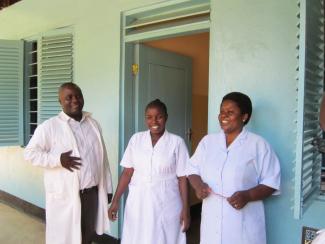Research
Tackling global problems together
 Wolf
Wolf
According to the last UNESCO World Science Report (2010), 78 % of global resources for research and development are invested in OECD countries. A further 16 % fall to China, India and the industrialised nations of East Asia, and a mere six percent is used in some 150 other countries. In view of the enormous challenges these countries face, this is far too little.
The research capacities of poor countries must be strengthened. Otherwise, they will not be able to tackle complex, global tasks that concern us all at the local level. Research capacities strengthen the autonomy of these states in global networks and negotiations, but also through the adoption, processing or application of new knowledge domestically.Accordingly, research partnerships between OECD countries and so-called developing and emerging countries matter ever more. Ultimately, they are about a global public good: building competent research capacities and generating new knowledge across the globe.
As Czapek, Hanne and Ziegenbalg (D+C/E+Z 2013/09, p. 344 f.) stress, building research capacities in developing countries is an important pillar for equal and effective partnerships. That requires a shared interest in the chosen topics. It also requires joint planning, mutual trust and mutual responsibility.
Success depends on how cooperation takes place in practice. In the 1990s, the Swiss Commission for Research Partnerships with Developing Countries (KFPE) drafted a set of guidelines. They help researchers to establish effective partnerships at eye-level. Researchers in developing countries must not just supply data, they must benefit from cooperation with OECD partners.
It was necessary to revise the tried-and-tested KFPE guidelines for several reasons:
- The international research context has changed. New actors have entered the scene, finance and power relationships are shifting, and new channels for disseminating knowledge have been established.
- Global challenges require new ways of finding solutions and new forms of cooperation.
- Obstacles and conflicting goals in building balanced partnerships must be addressed more decisively.
Eleven principles and seven basic questions
The guidelines are based on eleven principles and seven central questions. They contribute to proceeding in the most constructive and results-oriented manner. All principles address basic challenges and offer practical guidance.
KFPE’s 11 principles are:
- set agenda together,
- interact with stakeholders,
- clarify responsibilities,
- give account to all interested parties,
- promote mutual learning,
- enhance capacities,
- share data and networks,
- disseminate results
- pool profits and merits,
- apply results and
- secure outcomes.
The seven central questions deal with issues that can hinder or facilitate meaningful cooperation in different contexts. They make it easier to understand the nature of the partnership. The questions are:
- Why work in partnerships?
- How to ensure cohesion?
- What form of collaboration?
- Which foci and priorities?
- Who to involve?
- Where to create relevance?
- When to consolidate results?
Applying these eleven principles should support the partners in building trust and assuming mutual responsibility. Because there are different forms of collaboration, the path to building trust and taking on responsibility together cannot always be the same. In practice, it is advisable to determine first the essential requirements of a research partnership, and then to take a careful look at the principles that are of particular relevance in that context.
Diverging goals
Research partnerships often have a variety of goals:
- yielding knowledge in the form of new findings,
- real-world relevance to promote positive change,
- boosting individual or institutional capacities and
- applying the competences of all persons involved.
As a rule, research aims to gain knowledge. Scholars that are working on issues of global relevance, however, are increasingly expected to offer solutions to pressing problems. There is demand not only for new insights, but also for transformational knowledge. In planning and implementing research partnerships, such conflicting goals must be taken into account from the start. The KPFE guidelines help to rise to these challenges.
Switzerland has distinguished itself as a place with a long tradition of successful research partnerships with developing countries. This is evident, for example, in the Centre Suisse de Recherches Scientifiques in Ivory Coast or the Ifakara Health Research and Development Centre in Tanzania. Both centres were started more than 60 years ago with Swiss support and, thanks to many additional long-term partnerships, have become increasingly independent.
The National Centre of Competence in Research North–South (NCCR) was a 12 year programme of the Swiss National Science Foundation (SNF), an institution that funds research. Several parties were involved in the NCCR, including the Foreign Ministry’s Swiss Agency for Development and Cooperation (SDC).
A core concern of the NCCR was to build capacities in developing countries. Success was remarkable. More than 90 % of the graduates from the global south are now working in their home countries, either as scholars or as experts in the private and public sectors. This is what close research partnerships on an equal footing lead to. The NCCR experience was obviously based on the guidelines and informed the update.
Jon-Andri Lys is the executive secretary of the Commission for Research Partnerships with Developing Countries (KFPE) in Bern.
jon-andri.lys@scnat.ch
Alexander Schulze is a former member of the KFPE and used to work for the Novartis Foundation for Sustainable Development. He recently joined the Foreign Ministry’s Swiss Agency for Development and Cooperation (SDC).
alexander.schulze@eda.admin.ch
